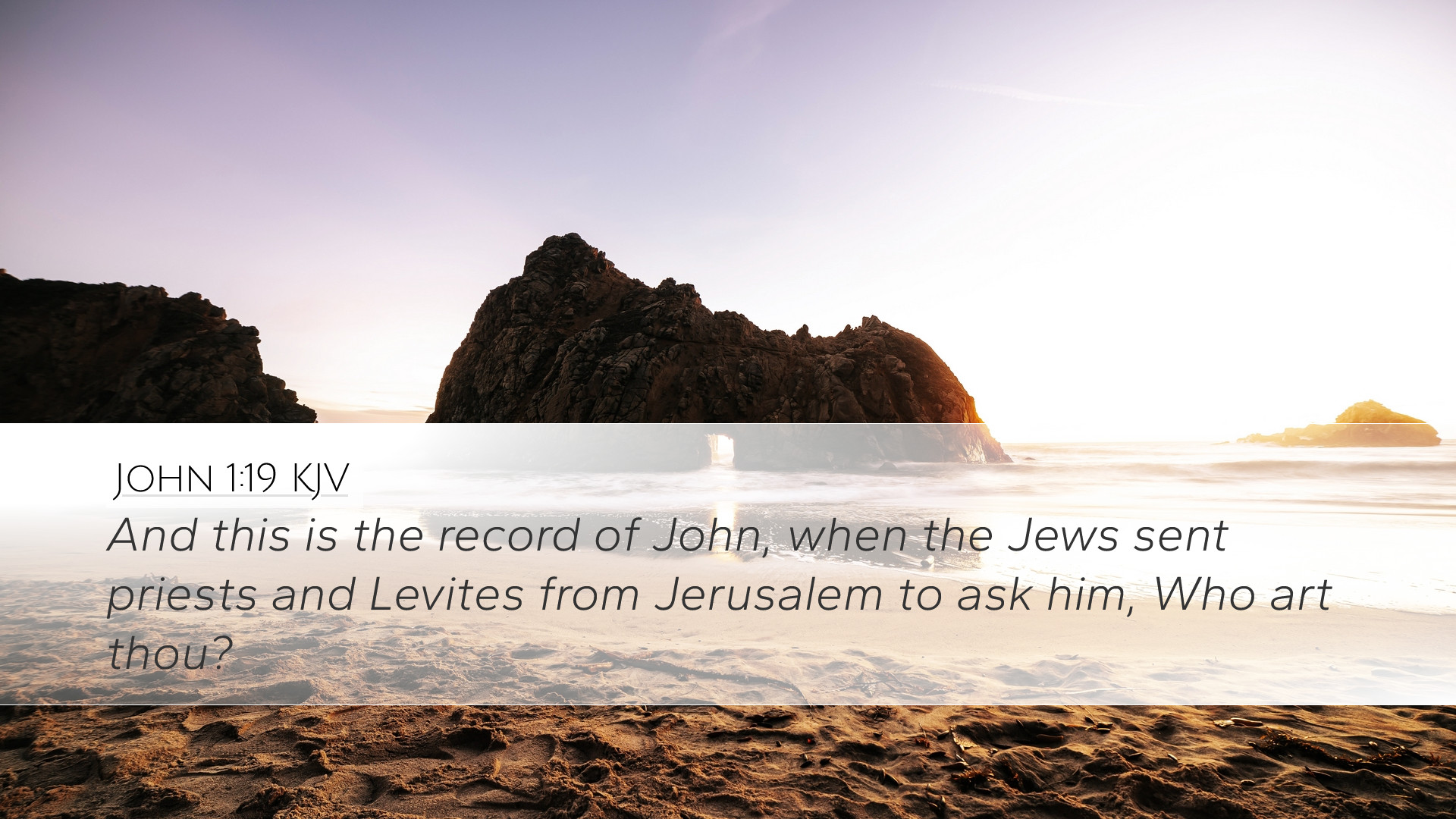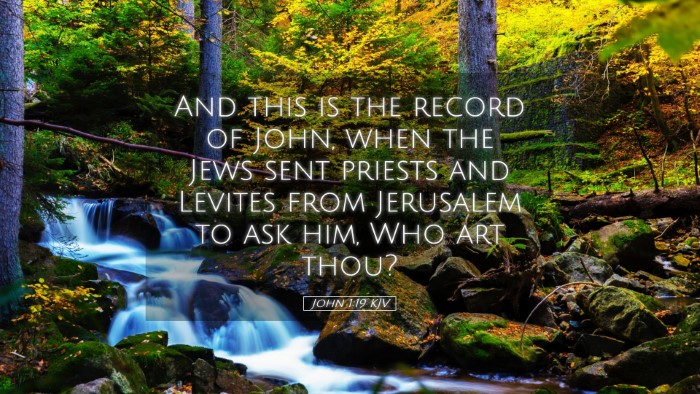Commentary on John 1:19
Verse: "And this is the record of John, when the Jews sent priests and Levites from Jerusalem to ask him, Who art thou?"
Introduction
This verse serves as a crucial transitional point in the Gospel of John, marking the introduction of John the Baptist's testimony and the unfolding of his pivotal role within the narrative. The inquiry posed by the religious leaders reflects the tension of the time and the expectations held concerning the Messiah's forerunner.
Contextual Analysis
The context of John 1:19 is vital for understanding its implications. Here, John the Baptist is already active in his ministry, proclaiming a message of repentance and preparing the way for Jesus. The delegation sent by the Jewish authorities signifies the serious interest in his role as a prophet, illustrating both skepticism and curiosity from the institutional religious structures of the day.
Insights from Matthew Henry
Matthew Henry offers a reflective approach to this passage, noting that the inquiry of the priests and Levites reveals the yearning for a legitimate authority in spiritual matters. He highlights the significance of the phrase "this is the record," underscoring John the Evangelist's intention to provide a reliable witness to the truth of Christ’s identity.
Henry elaborates on the nature of the delegation's question, pointing out that the leaders sought to discern John's identity based on human standards and expectations. They were accustomed to a tradition that esteemed lineage and formal schooling, contrasting with the grassroots nature of John’s prophetic ministry.
Insights from Albert Barnes
Albert Barnes emphasizes the importance of the context in which this question arises. He explains that the Jews’ inquiry into John’s identity reflects a broader need for authenticity in prophetic voices. Barnes notes that their questioning implies a deep-seated doubt about who could carry such authority in matters of faith.
Additionally, Barnes observes that the appearance of such an inquiry signifies the tumultuous socio-political environment in which John operated. The delegation from Jerusalem indicates a formal and potentially confrontational approach, indicative of the religious leaders' apprehension about the societal impact of John’s ministry.
Insights from Adam Clarke
Adam Clarke provides a detailed exegesis of the term "record," interpreting it as a formal testimony. Clarke posits that the testimony of John the Baptist is foundational for understanding Christ's mission. He argues that the questioning from the Levites and priests underscores a struggle for acknowledgment of prophetic authority in a landscape that would soon see that authority challenged.
Clarke mentions that the Jewish leaders' question encapsulates multiple layers of inquiry, including John’s potential messianic claims. He points out that the phrasing of their question indicates a desire to define and control the narrative surrounding prophetic figures, which can also be viewed as a prelude to their eventual rejection of Jesus himself.
Theological Implications
The interaction depicted in John 1:19 contains rich theological implications for understanding the nature of revelation and witness in Christian faith. The delegation’s questioning highlights humanity’s tendency to seek verification of the divine mission through earthly standards.
Both Henry and Barnes point out the eventual culmination of these inquiries in the recognition of Jesus Christ, arguing that John functions as an essential precursor who illuminates the path to understanding Christ’s true nature as the Son of God.
Application for Pastors and Theologians
This verse encourages pastors and theologians to consider the importance of their own testimonies in relation to the Gospel. The manner in which John the Baptist approached his ministry, characterized by humility and a steadfast focus on Christ, provides an exemplary model.
- Authenticity in Ministry: Much like John, contemporary ministers must strive to bear witness to Christ authentically and sincerely, rather than seeking validation through human accolades.
- Engagement with Questions: The verse exemplifies the necessity of engaging with both believers and skeptics in a dialogue that seeks truth, understanding that questions are often gateways to deeper revelation.
- Role of Prophecy: Understanding the prophetic role as one that points toward Christ remains essential in theological discourse; ministers should encourage congregants to discern the relevance of prophetic messages today.
Conclusion
In summary, John 1:19 serves as a vital entry point into the Christian Gospel narrative. The complexity of the religious authority’s inquiry and John’s forthcoming responses not only establish his role but also foreshadow the significant conflict and revelation that will unfold as the Gospel progresses. By reflecting on the insights provided by eminent commentators, pastors, students, and theologians can gain a multi-faceted understanding of this pivotal text.


